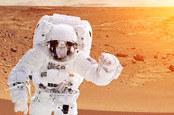This article is more than 1 year old
I studied hard, I trained for years. Yay, now I'm an astronaut in space. Argggh, leukemia!
Only veteran 'nauts should think about going to Mars, judging by this research
Floating silently among the stars may sound idyllic, but the longer you stay in space, the worse it is for your immune system, according to this latest research.
NASA teamed up with boffins at the University of Arizona, University of Houston, and Louisiana State University, in the US, to analyse blood samples from eight International Space Station astronauts. They found that natural killer cells (NK cells), a type of white blood cell critical for fighting off viral infections and cancerous tumors, were impaired for 'nauts spending longer than six months in space.
The blood samples were taken before, during, and after the astronauts’ stay on the orbiting science lab. Each batch of NK cells were pitted against leukemia-diseased cells in a series of lab experiments, and the researchers watched the two groups duke it out.
They found that by the time the crew members had spent 90 days in space, the activity of their NK cells had reduced by approximately 50 per cent and were less effective at fighting off cancerous cells.
Having a weak immune system in space is dangerous, said Richard Simpson, an associate nutritional sciences professor at the University of Arizona, and senior author of the paper published by the American Physiology Society.
“When you’re in the space station, it’s a very sterile environment – you’re not likely to pick up the flu or a rhinovirus or some community-type infection – but the infections that are a problem are the viruses that are already in your body," he explained earlier this month. "These are mostly viruses that cause things like shingles, mononucleosis or cold sores; they stay in your body for the rest of your life, and they do reactivate when you’re stressed.”
On top of viral infections, don’t forget the onslaught of radiation particles streaming in from solar flares or intergalactic space, even with radiation shielding in place. These highly energetic particles slam into the human body, and raise the risk of cancer and other degenerative diseases through genetic mutations. Not a great time for your body's anti-cancer bio-cops to take a nap.
The effect will be even worse for future astronauts embarking on a long journey to Mars. Without the safe cocoon of Earth’s magnetic field, the space explorers are exposed to higher doses of radiation. A previous experiment found that a year-long round trip to the Red Planet dishes out more than half the maximum radiation dose recommended for an astronaut's whole career.
Interestingly, the effect of weakened NK cells were less pronounced in experienced astronauts compared to novices. “Serendipitously, we found that half our crew members had flown before, and the other half hadn't," said Simpson. "So we were able to just split them in half to see if there was an effect, and there was. The 'rookies' had greater drops in NK-cell function compared to the veterans."
The researchers are unsure why old-timers – one participant had spent a whopping 340 days in space – had stronger immune systems compared to first-timers in space. It could be down to age, or the stresses of adapting to a new, unfamiliar environment.
“When we look at the [NK cells] function of the astronaut samples during flight compared to their own samples before they flew, it goes down. When we compare them to controls who stayed on Earth, it still goes down,” Simpson concluded. “I don’t think there’s any doubt that NK-cell function is decreasing in the spaceflight environment when analyzed in a cell culture system.”
The mission to Mars could take up to three years. Astronauts hoping to see the Red Planet up close face a whole host of other health problems, too, such as a bad back, long-term brain damage, and deformed eyes. Thanks, space. ®

